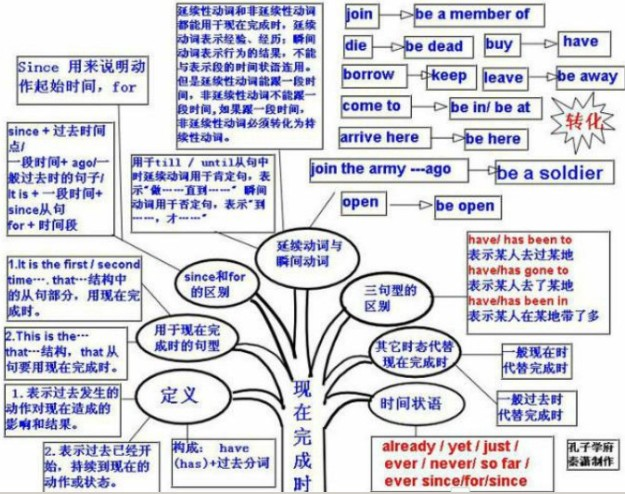本试题 “A British man who ____ to play practical jokes ____ his own humorous art work in four major New Yorkmuseums over the last two weeks.[ ]A. liked; ha...” 主要考查您对一般现在时
现在完成时
等考点的理解。关于这些考点您可以点击下面的选项卡查看详细档案。
- 一般现在时
- 现在完成时
一般现在时的概念:
表示通常性、规律性、习惯性的状态或者动作(有时间规律发生的事件)的一种时间状态。
一般现在时的用法:
1)经常性或习惯性的动作,常与表示频度的时间状语连用。常用的时间状语有every...,sometimes,at...,on Sunday等。
例如:I leave home for school at 7 every morning. 每天早上我七点离开家。
2)客观真理,客观存在,科学事实。
例如:The earth moves around the sun. 地球绕太阳转动。
Shang hai lies in the east of China. 上海位于中国东部。
3)表示格言或警句。
例如:Pride goes before a fall. 骄者必败。
注意:此用法如果出现在宾语从句中,即使主句是过去时,从句谓语也要用一般现在时。
例如:Columbus proved that the earth is round. 哥伦布证实了地球是圆的。
4)现在时刻的状态、能力、性格、个性。
例如:I don't want so much. 我不要那么多。
Ann writes good English but does not speak well. 安英语写得不错,讲的可不行。
比较:Now I put the sugar in the cup. 把糖放入杯子。
I am doing my homework now. 我正在做功课。
第一句用一般现在时,用于操作演示或指导说明的示范性动作,表示言行的瞬间动作。
第二句中的now是进行时的标志,表示正在进行的动作的客观状况,所以后句用一般现在时。
一般现在时知识体系:

一般现在时用法拓展:
1、一般现在时表将来:
1)下列动词come, go, arrive, leave, start, begin, return的一般现在时可以表示将来,主要用来表示在时间上已确定或安排好的事情。
例如:The train leaves at six tomorrow morning. 火车明天上午六点开。
—When does the bus star? 汽车什么时候开
—It stars in ten minutes. ?十分钟后。
2)以here, there 等开始的倒装句,表示动作正在进行。
例如:Here comes the bus.=The bus is coming. 车来了。
There goes the bell.=The bell is ringing. 铃响了。
3)在时间或条件句中。
例如:When Bill comes(不是will come), ask him to wait for me. 比尔来后,让他等我。
I'll write to you as soon as I arrive there. 我到了那里,就写信给你。
4)在动词hope, take care that, make sure that 等的宾语从句中。
例如:I hope they have a nice time next week. 我希望他们下星期玩得开心。
Make sure that the windows are closed before you leave the room. 离开房间前,务必把窗户关了。
2、一般现在时代替一般将来时:
When, while, before, fter, till, once, as soon as, so long as, by the time, if, in case(that), unless, even if, whether, the moment, the minute, the day, the year, immediately等引导的时间状语从句,条件句中,用一般现在时代替将来时。
例如:He is going to visit her aunt the day he arrives in Beijing. 他一到北京,就去看他姨妈。
3、一般现在时代替一般过去时:
1)"书上说","报纸上说"等。
例如:The news paper says that it's going to be cold tomorrow. 报纸上说明天会很冷的。
2)叙述往事,使其生动。
例如:Napoleon's army now advances and the great battle begins. 拿破仑的军队正在向前挺进,大战开始了
4、一般现在时代替现在完成时:
1)有些动词用一般现在时代替完成时,如hear, tell, learn, write, understand, forget, know, find, say, remember等。
例如:I hear(=haveheard)he will go to London. 我听说了他将去伦敦。
I forget(=have forgotten)how old he is. 我忘了他多大了。
2)用句型"It is…since…"代替"It has been…since…"。
例如:It is(=has been)five years since we last met. 从我们上次见面以来,五年过去了。
5、一般现在时代替现在进行时:
在Here comes…/There goes…等句型里,用一般现在时代替现在进行时。
例如:There goes the bell.铃响了。
时态一致:
1、如果从句所叙述的为真理或相对不变的事实,则用现在时。
例如:At that time, people did not know that the earth moves. 那时,人们不知道地球是动的。
He told me last week that he is eighteen.上星期他告诉我他十八岁了。
2、宾语从句中的,助动词ought, need, must, dare的时态是不变的。
例如:He thought that I need not tell you the truth. 他认为我不必告诉你真相。
现在完成时的概念:
现在完成时用来表示之前已发生或完成的动作或状态,其结果的影响现在还存在;也可表示持续到现在的动作或状态。其构成:have(has)+过去分词。
现在完成时共有四种主要用法:
一、现在完成时表示影响:
该用法的现在完成时表示一个过去发生的动作在过去已经完成,并且这个过去发生并完成的动作对现在有影响或结果,同时说话者强调的或感兴趣的就是这个影响或结果,如汉语说“他已离开这个城市了”,其中的“离开”肯定发生了,它对现在的影响或结果就是“他现在已不在这个城市了”;又如汉语说“有人把窗户打破了”,显然“打破窗户”这一动作发生在过去,并且在过去已经完成了,但说话人强调的重点是打破窗户对现在的影响—窗户现在仍是破的。
如:He has left the city. 他已离开这个城市。(结果:他不在这个城市。)
Someone has broken the window. 有人把窗户打破了。(结果:窗户仍破着。)
I have lost my pen. 我把钢笔丢了。(结果:我现在无钢笔用。)
He has finished his work. 他把工作做完了。(结果:他现在可以做其他的事了。)
二、现在完成时表示持续:
该用法的现在完成时表示一个过去发生的动作或开始的状语在过去并未完成或结束,而是一直持续到现在,并且有可能继续下去(也可能到此结束),如汉语说“他在我们学校教书已有30年了”,显然“他在我们学校教书”是从30年前开始,并且一直教到现在,已经持续了30年;又如汉语说“自上个星期以来他一直很忙”,显然“忙”是从上个星期开始的,并且这一“忙”就一直忙到现在。
如:He has taught in our school for 30years. 他在我们学校教书已有30年了。
He has been busy since last week. 自上个星期以来他一直很忙。
He has worked for us ever since he left school. 他离开学校以后就一直为我们工作。
三、现在完成时表示重复:
即表示从过去某个时间直到现在的这个时间范围内不断重复发生的动作或情况,并且这个不断重复的动作有可能继续下去,也有可能到现在就结束。
如:How often have you seen her? 你隔多少见她一次?
My father has always gone to work by bike. 我父亲一向骑车上班。
四、现在完成时表示将来:
同一般现在时可以表示将来一样,现在完成时也可以在时间状语从句里表示将来。
如:I'll wait until he has written his letter. 我愿等到他把信写完。
When you have rested, I'll show you the garden. 等你休息好之后,我领你看我们的花园。
现在完成时知识体系:

比较一般过去时与现在完成时:
1)一般过去时表示过去某时发生的动作或单纯叙述过去的事情,强调动作;现在完成时为过去发生的,强调过去的事情对现在的影响,强调的是影响。
2)一般过去时常与具体的时间状语连用,而现在完成时通常与模糊的时间状语连用,或无时间状语。一般过去时的时间状语:yesterday, last week,…ago, in1980, in October, just now等,皆为具体的时间状语。现在完成时的时间状语:for, since, sofar, ever, never, just, yet, till/until, up to now, in past years,always等,皆不确定的时间状语。共同的时间状语:this morning, tonight, this April, now, already, recently, lately等。
3)现在完成时可表示持续到现在的动作或状态,动词一般是延续性的,如live, teach, learn, work, study, know。一般过去时常用的非持续性动词有come, go, leave, start, die, finish, become, get married等。
例如:I saw this film yesterday.(强调看的动作发生过了)
I have seen this film.(强调对现在的影响,电影的内容已经知道了)
Why did you get up so early?(强调起床的动作已发生过了)
Who hasn't handed in his paper?(强调有卷子未交,疑为不公平竞争)
He has been in the League for three years.(在团内的状态可延续)
He has been a League member for three years.(是团员的状态可持续)
句子中如有过去时的时间副词(如yesterday, last, week, in1960)时,不能使用现在完成时,要用过去时。
(错)Tom has written a letter to his parents last night.
(对)Tom wrote a letter to his parents last night.
与“A British man who ____ to play practical jokes ____ his o...”考查相似的试题有:
- ―The telephone is ringing.―I _________ answer it.A.willB.am going toC.am toD.am about to
- The old man insisted that I ____ his wallet and that I ____ with him to the police station.A.take, goB.had taken, g...
- I’m leaving for Hainan on holiday this afternoon. At this time tomorrow, I _____ on the beach. A.are going to walkB...
- In this country, coal electricity.A.is used to produceB.is used to producedC.is used to producingD.used to produce
- Barbara is easy to recognize as she’s the only one of the women who _____ evening dress.A.wearB.has wornC.have wor...
- —The rain ________ fast and heavy.—You should ________ some shelter. Look at you—you are all wet.A.is coming; findB...
- I’m afraid I won’t be available then. I _____ a friend off at 3:00 this afternoon.A.seeB.am seeingC.will seeD.wil...
- Edward, you play so well, but I _____ you play the piano.A.didn’t knowB.hadn’t knownC.don’t knowD.haven’t known
- His father was born in the year when our country .A.was builtB.was set upC.was foundD.was founded
- Cell phones _______ by more and more teens and many new functions _______ to them nowadays.A.are using, have addedB...